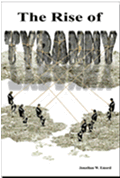CONVERGING
ON TECHNO-FEUDALISM
PART 1 of 2
By Professor
Steven Yates
July 26, 2015
NewsWithViews.com
[Author’s note: my book Four Cardinal Errors (2011) introduced the idea of technofeudalism. I chose this term for the political economy towards which an intergenerational superelite has been directing much of the world for over a century. While preserving some of the vocabulary and outward features of market capitalism, technofeudalism is about social control. Its tools include artificial scarcity, the destruction of education, and fear induction, reducing common people to the status of permanently cash-strapped, mentally paralyzed subjects — living with the world’s most advanced technology but equivalent to serfs. Hence the term technofeudalism. There is reason to believe the effort will not succeed in the long run. But the attempt has already done colossal damage, and will do more as it slowly destabilizes. This is something we can only prepare for as best we can, starting by minimizing contact with organizations the superelite controls, while building skills to meet our own needs.]
1.
During the post-war era with the mixed economy expanding nicely, we saw "convergence" theories of the future holding that the most dynamic features of market capitalism would quietly incorporate more and more elements of socialism, preserving the energy and productivity of markets, but tempered and regulated by state agencies and stabilized with social safety nets. Some even spoke of a gradual merging of U.S. and Soviet systems (Charlotte Thomson Iserbyt has a wealth of relevant information on her site about this).
Then, when the Soviet Union collapsed, we heard about the "end of history." Francis Fukuyama’s The End of History and the Last Man (1992) became one of the most widely discussed books of its time, and reasonably so. Attentive readers learned something of the major philosophers whose ideas have wielded influence down through the ages, from Kant and Hegel through Nietzsche down to Leo Strauss and Alexandre Kojève, a 1930s-era interpreter of Hegel and Nietzsche whose thinking on the liberalization of the West permeates The End of History. So much for the naïve idea that philosophy is irrelevant to modern civilization!
Fukuyama’s major premise: the ideological clash that had dominated the thought and lives of the previous generation was over. Market capitalism had won, almost by default. Other dictatorships, moreover, had ended (e.g., in Chile). Democratic institutions and a market-based neoliberal order were taking hold everywhere. Even China was embracing global markets despite the hold its Communist Party retained over Chinese corporate life — something which, it was hoped, would be temporary. The prospects for a worldwide embrace of liberal democracy had never seemed better! Although there might be some holdouts based on religious orthodoxy (e.g., in the Muslim world), there would be no more ideological battles of the scale that characterized the cold war era. Hence, in a broad, metaphorical sense, it was the end of history.
One by one, things began to go wrong with this image of a rising neoliberal utopia.
2.
Trade deals such as the North American Free Trade Agreement (NAFTA) began to decimate the U.S. manufacturing base. NAFTA went into effect on Jan. 1, 1994. The “giant sucking sound” predicted by Ross Perot began. Plants closed, releasing workers who had earned $15 - $20 an hour. Operations went to Mexico, for labor that cost the owners perhaps $1 an hour (these figures aren’t exact, but you get the idea). NAFTA wasn’t the first. The original General Agreement on Tariffs and Trade (GATT) dates from the 1940s, during the wave of fascination with global governance which also gave us the UN, the IMF, the World Bank, and Bretton Woods. With GATT II put in place the year after NAFTA and the newly created World Trade Organization overseeing things, manufacturing went to China for still cheaper labor. Tech call-center jobs went to India. Companies that resisted the tidal wave of labor arbitrage couldn’t compete. Contrary to the language they used, these trade deals were never about free trade in the sense of Bastiat or Ricardo. They were about trade managed by governments for global corporations to increase the latter’s profits by ensuring them cheap labor forces and lax regulatory environments. We weren’t supposed to ask how we could have free trade with a country still controlled by its Communist Party.
Arguably, NAFTA also destroyed Mexico’s agricultural base. Mexican family farms could not compete with U.S. “agri-biz.” They went out of business, just like the mom-and-pop stores in the U.S. who couldn’t compete with Walmart. Newly impoverished cities and towns in Mexico were vulnerable to the infamous drug cartels. Mexicans crossed the open U.S. border in search of work. They found it in construction. The U.S. now had its own cheap labor force. This also pleased corporations. Population increases drive down wages. Supply and demand applies to workers, too.
Thus
despite the booming-economy happy talk of the 1990s, it was the beginning
of the end of the financially independent middle class in the U.S. The
1990s became an era of easy money, but it wasn’t sustainable; by
late 2000 the wheels had come off and dot-coms were going bust by the
dozens. It would take a couple of decades, but the standard of living
is now dropping due to a combination of factors: higher health care costs
not mitigated by the Unaffordable Care Act, higher premiums resulting
from the Act itself, higher food costs not factored into “core inflation,”
rent increases, and massive student loan debt — on top of a hostile
job market. Ask the millennials.
Rising unemployment, chronic underemployment, and worsening wage gaps
have become the most debated topics of the era of untrammeled neoliberalism:
despite the credit-fueled boom of the 1990s, wealth was redistributed
upward. This was one result of an economy based on financialization instead
of production. Wealth concentrated in the hands not of a one-percent but
in those of a .01%.
One could also ask, was technology making a lot of jobs obsolete? Creative destruction had happened before and would happen again. According to Schumpeter, creative destruction was central to the capitalist engine, mercilessly wiping out the old and making room for the new. New technology, economists argue, creates more jobs than it destroys. Except that this time it isn’t happening, or at least not fast enough. For one thing, change has never before come about this rapidly. For another, the machines are getting “smarter.” Corporations need fewer human workers. This hasn’t been part of the creative destruction equation of the past. These trends are continuing, in addition to an existing longstanding mismatch between what employers want and the skills the workforce has to offer. No one wants to train new employees. The corporate world sees this as higher education’s job.
3.
Higher education has had its own problems. The "culture wars" turned academia into an ideological battlefield. Worse: the quality of students began to drop some time ago, as government secondary schools failed to educate and one “reform” after another bit the dust. You know the names: Mastery Learning, Outcome-Based Education, Performance-Based Education, School-to-Work, No Child Left Behind; now it’s Common Core. Students entered college in ever larger numbers unprepared for college-level work, and afraid of subjects like mathematics. Many couldn’t do simple arithmetic without calculators. The “new math” introduced back in the 1960s proved disastrous. We need more engineers and other technologists, pundits bleat. Both require math. Lots of math. Calculators will only do so much. Plug in the right formulas and push the right buttons, and they will spit out the right results. They won’t tell you which formulas you need or which buttons to push. The M in STEM stands for mathematics. However much STEM education was promoted, no one could force American students to learn to do math, and the U.S. fell out of the top ten nations in its capacity to produce scientists and engineers. College math and physics classrooms filled up with Taiwanese and South Korean students. In their homelands, education is taken seriously. Their schools aren’t football mills or de facto laboratories for the latest edu-fads. Foreign students sometimes faced resentment from their American counterparts. It wasn’t their fault they studied while Americans watched football and Reality TV.
Add to this the adjunctification of academia during the neoliberal era. This is the gradual replacement of tenured career faculty with contingent instructors, or adjuncts, who work part-time for starvation wages, no benefits, and no job security. If you are a university undergraduate today, there is a good chance your professors are paid less than the girl behind the counter at the McDonalds across the street from the university. One of the nastiest secrets of contemporary academia is its own extreme wage gap. The fact is, around 70% of all faculty members on college and university campuses are now contingent. Some have multiple jobs, with commutes between three and more campuses. They may be on a particular campus one day a week. They often do not have private office space. Their lives, it goes without saying, are generally very stressful unless they have nonacademic sources of income. Many are one health emergency from living in their cars. Some have died from possibly treatable conditions because at the end of their careers, they were flat broke!
Top administrators in large universities, meanwhile, are paid six figures. A few are paid still more. The highest paid person at a large state institution is usually the head football coach. He is usually a millionaire. The point is, money exists in these systems to pay contingent faculty living wages. The problem is not genuine scarcity but allocation. This is part of worsening corruption in higher education. Indeed, universities now have their own cheap labor force. Economists, at this point, will chime in that a surplus of Ph.D.s is primarily responsible for this situation. They will contend also that aspiring university professors should have known what they were getting into. Such sterile economic arguments ignore the damage the present situation is doing to higher education. Student access to adjunct professors is spotty at best. Their professor is likely on the way to his next job, which might be in a neighboring city. Lack of access harms student learning, as students often can’t get what they need from a textbook. Remember that they are now going massively into debt to afford higher education! Some of this absurdly high tuition goes to pay the layers of administration now infesting every institution. What students experience is a subtle, psychological push away from liberal arts learning and into vocational training. To pay back the massive debt they are accruing, the average student now thinks, I have to get a good job!
Even the chances of that are steadily diminishing. Adjunctification in academia is just one instance of the precariatization of the workforce generally during the neoliberal era: the emergence of an army of “temp workers,” “permatemps,” “independent contractors,” “dependent contractors,” and so on: what British labor economist Guy Standing calls “the precariat: a dangerous new class.” Many in this class are well educated, with advanced degrees. Standing argues that globalization, as it has evolved, has generated a precarious workforce corporations and other institutions (e.g., universities) can use and abuse, as it has no power base of its own, at least not yet. New attempts to unionize are occurring, from universities to Walmart to the fast food industry. Minimum wage increases are on the table. The latter will likely backfire, as small businesses are forced to close and cause still more unemployment. The large corporations (who can afford to pay living wages!) are well protected. Precariatization of the workforce on a global scale is an essential part of the path to the technofeudalism I wrote of in Four Cardinal Errors.
Universities are now entirely different from when I was an undergraduate in the 1970s. They look increasingly like corporate facilities. Political correctness dominates the humanities and the social sciences, where many tenured faculty turn their classrooms into launching pads for the latest variants of hard-left ideology (a way to survive in academia is to be politically correct!). Some students, who grew up with identity politics, are even more extreme than their cultural Marxist instructors. The latest buzzwords are microaggression, trigger word, safe space (safe from white males, that is). The new rule: never say or do anything that might offend someone in an officially-designated minority group!
Subjects like philosophy, literature, and history are unteachable in this environment. They are, moreover, discredited in the eyes of those who consider such ideas as “science is sexist because most of its practitioners are men” to be ludicrous. They invite ridicule: “will feminist airplanes stay aloft for feminist engineers?” asked a traditional-minded woman philosopher back in the 1990s. Other disciplines, however, are corporatized and vocationally-focused. Their defenders’ blunt response is now to suggest dropping liberal arts subjects altogether, rather than supporting those of us with traditional views of liberal arts learning as necessary for citizenship in a free society. What is wanted is a system designed to produce worker bees, assembly-line like, with a mindset of subservience: to an employer, to the state in all its guises, and to the mass consumption culture where everything is commodified — for the few who can afford to consume!
4.
Since 2000, things have gone to pieces. The 9/11 attacks happened, and however one interprets them (inside job or not), they did change the country. The war machine flexed its muscles as the U.S. government went into an Iraq it proceeded to destroy at taxpayer expense. On the domestic front, the surveillance state rose to power. Abundant evidence surfaced of unconstitutional government spying on civilians. Despite disclosures, nothing changed. Police, as I’ve written before, were militarized as if on battlefields. Indeed, the “war on terror” has turned the “homeland” into a battlefield, since “terrorists” can be anywhere! Some police now act like members of an occupying army, and U.S. citizens a conquered enemy. They have become increasingly violent (see below). More people have now been killed by police in the U.S. since 9/11 than have been killed by police in all other major nations combined during this same period, including in authoritarian China.
The U.S. now has a larger percentage of its population incarcerated than any other advanced nation in the world. Most are in for “victimless crimes.” Not all are related to the disastrous “war on drugs.” Lose your job in the Meltdown of 2008, be divorced by a spouse who turned out to be a sociopath, and fall behind on your child support? To jail with you! Many family court judges are probably also sociopathic. They throw struggling people in jail for as long as six months with one signature on a piece of paper. This causes those convicted to fall further behind, as jail time tends to hinder your earning power! I have seen people chewed up and spit out by the once well-intentioned but now irrational and sadistic family court system!
Corruption is now everywhere! Consider elections. Since Citizens United, which writers across the political spectrum ought to agree was one of the worst Supreme Court decisions ever, the corruption of the election process by money has become so obvious no one even denies it anymore.
A recent study in a refereed academic journal has concluded openly that the U.S. has the features of an oligarchy, not a democracy or a republic. A plutocracy, in fact: government by the rich, operating through financial leviathans such as Goldman Sachs and JP Morgan. The liberal democracy lauded as triumphant back in the early 1990s is dead. And what we saw as market capitalism is really a circumscribing corporatism.
Neoliberalism is not and never was about liberty. Not unlike Communism, it was about power: the power of the purse (corporate dollars) making use of the power of the sword, as opposed to the naked power of the sword (that of the openly totalitarian state). It was a license for global corporations to do as they please, with the rest of the world forced to suck it up, rationalized with: “this is the free market at work.” Thus the rich got richer and the wealth gap widened to a point in which it threatens to destabilize entire regions. Even the superelite Davos crowd worries about it. At this past January’s World Economic Forum summit, the wealth gap was the main topic of discussion. The globalists are more than aware that struggling masses, conscious of their situations and not buying, e.g., Margaret Thatcher’s TINA (there is no alternative), are drawn to populism. Their response to populist movements varies from case to case. Sometimes they punish affected nations by withdrawing investments. Jobs vanish as the economy tanks. Shortages begin; inflation soars; the government goes broke, causing more unrest. Monied interests then bankroll “regime change” to get rid of the populists and return the oligarchs to power. Examples of variations on this pattern: Iran in the 1950s; Guatemala in the 1950s; Southeast Asia in the 1960s; Chile in the early 1970s; Ecuador and Panama in the early 1980s; Venezuela in the 2000s and more recently, although efforts to dislodge populism there have failed despite leaving the country’s economy in ruins. Corporate-controlled Western mainstream media have purposefully fostered confusion between indigenous populism and actual Marxism-Leninism, of course, something easy to do when schools do not teach the theory behind or sources of either one, and made worse by the fact that Communists obviously did exploit neoliberal abuses in Central and South America.
We’ve had a “convergence” all right, but it hasn’t been what 1960s idealists wanted or imagined! Neoliberal ideology, in fact, has papered over a gathering nightmare — rising technofeudalism, what is becoming the real political economy of both the industrializing and post-industrial worlds. Some have called it a “new world order”; others (e.g., the Trilateral Commission), a “new international economic order.”
Technofeudalism is not merely a path the world is on. It is nearly in place. Its instruments include neoliberal ideology, “free trade” agreements providing favors to corporations, education as job skills training with liberal arts learning neutralized or destroyed, and the creation of a precarious global workforce. Sadly, this includes countries such as Chile, corporatized during the Pinochet dictatorship by the “Chicago Boys” (disciples of pivotal neoliberal economist Milton Friedman) and where, despite “democratization” in the 1990s and continued economic development since, a severe wage gap has persisted. Chile is a partner to the latest potentially disastrous trade deal: the Trans-Pacific Partnership (TPP).
No one knows for sure what is in the TPP outside its corporate-sponsored authors and a few in Congress who have been allowed read it without being allowed to copy or even take notes on it. The latter were threatened with criminal prosecution if they revealed its contents to the public! These are members of the U.S. Congress we are talking about, not journalists!
|
|
That should speak volumes about where the locus of power really is! What we know, based on leaks, is that the TPP contains 29 chapters only five of which are about trade. The rest grant favors of various sorts to corporations, especially if they outsource jobs for still cheaper labor (in, e.g., Vietnam). The TPP contains provisions on intellectual property. There is reason, admittedly circumstantial (how could it be otherwise?), to think these will eventually be used to restrict free speech on the Internet, jeopardizing sites like this one and outsider-writers such as myself. For part two click below.
Click here for part -----> 1, 2,
� 2015 Steven Yates - All Rights Reserved
Steven Yates has a doctorate in philosophy and currently lives in Santiago, Chile. He is the author of Four Cardinal Errors: Reasons for the Decline of the American Republic (Brush Fire Press International, 2011). He also owns an editing business, Final Draft Editing Service.
Steven Yates's new ebook is entitled: Philosophy Is Not Dead: A Vision of the Discipline's Future.
E-Mail: freeyourmindinsc@yahoo.com















 Share
This Article
Share
This Article






